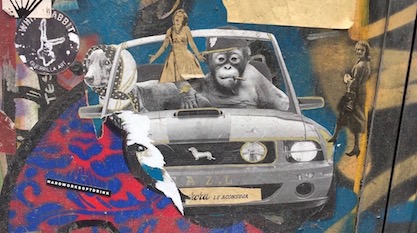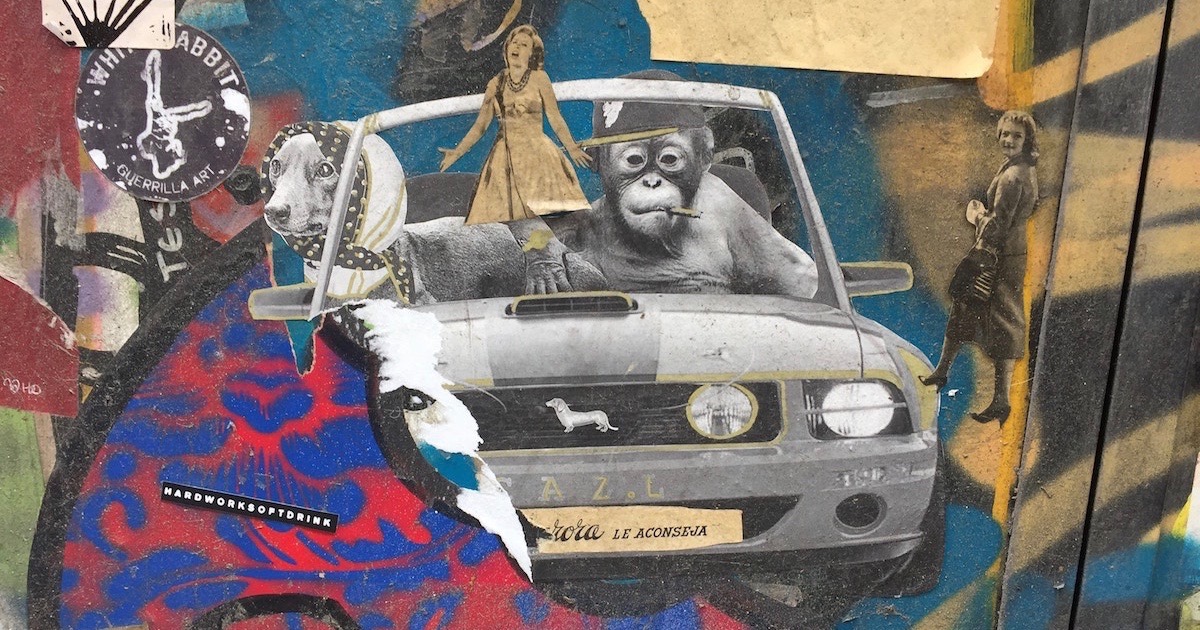 Culture & Ethics
Culture & Ethics
 Evolution
Evolution
Chimpanzee Liberation? Why Animal Rights and Human Rights Cannot Coexist


We live in profoundly anti-human times. Progressive cultural movements across a broad array of issues, from bioethics to environmentalism, seek to push us off the pedestal of unique value in both culture and public policy.
Many academics, biological scientists, and evolutionary philosophers have joined the anti-human crusade. Most recently, a “manifesto” published in the science journal Human Evolution declares that chimpanzees and bonobos (together, the two species constitute the genus Pan) should be considered legal “persons,” “emancipated” from human control, and granted fundamental, legally enforceable “rights.”
“Apes Are People Too”
How do the scientist and philosopher authors justify their “apes are people too” conclusion? By blatantly anthropomorphizing the animals’ natural behavior — an approach pioneered by the primatologist Jane Goodall, who attributed thoughts and motivations to the animals she wrote about in the science papers she published. (Unsurprisingly, the preparation of the manifesto was supported, in part, by the Jane Goodall Institute.) The manifesto authors assert, for example, that chimpanzees and bonobos have “culture” and “language” and that therefore they should be viewed as morally equivalent to primitive human hunter-gatherers.
There is no question that chimpanzees are remarkable animals, and we certainly should treat them humanely. For example, they are highly social, and so it is cruel to isolate them in cages. But the reason that we refrain from doing so is that it’s our duty to treat all animals humanely in light of our best understanding of their natures and needs, not because chimpanzees and bonobos possess natural rights.
Comparison with the Holocaust
But don’t tell that to the manifesto authors, who outrageously equate wrongful treatment of chimpanzees with the evil of the Holocaust (citations omitted):
Parallels can be made between the personal/cultural devastation of captive Pan to those of enslaved or concentration camp imprisoned humans. These include transport conditions, mortality rate, tattooing numbers and the removal of any sign of selfhood, heritage, customs, and cultural identity. Furthermore, splitting up families, erasing privacy, dignity and choice, result in the ruin of their cultures and traditional ways of life.
The authors completely miss a relevant point that concepts such as “dignity,” “heritage,” “customs,” “cultural identity,” and “traditional ways of life” are distinctly human constructs. More important, equating the mistreatment of animals to the Holocaust is odious, because it dilutes the evil of that horrific event to lesser wrongdoing. That such a relativistic comparison between the captivity and/or abuse of chimpanzees was made to genocide in a learned science journal by supposedly rational academics is particularly beyond the pale.
The authors want to reclassify chimps and bonobos as “pre-human,” which supposedly would entitle them to the status of “personhood” and to equality with us:
Henceforth, Pan can no longer be legally categorized as “property”, as they define their own property and are hominin [human or ancestral to human] beings who should live in freedom, possessing personality and selfhood as members of a community with unique group-identity and culture. They should be allowed to live their lives peacefully in a meaningful way with interests and goals, and fulfill their personal potential, without constant fear, trauma, torture, and the risk of death by being imprisoned. They ought to live through personal agency and cultural protection, conducting free daily life within their socially supported communities. As there are “natural rights of humans,” likewise there must be natural rights of Homo/hominins.
Please. Chimps are not civilized in the way of human beings. They don’t “define their own property,” have “goals,” or strive to “fulfill their personal potential” as we do in the exercise of our free will. They live by instinct and according to their biological capabilities and natures, over which they have no control, and against which they have no capacity to rebel.
Chimp Emancipation
Never mind: The authors declare for chimp emancipation!
Awarding Pan with autonomy and self-determination will ensure their freedom of action as well as expression of their potential without apprehension of personal harm of any kind, which is essential for the continuity of their cultural existence. Such rights of freedom and independence were hitherto endowed solely within the human society, and we hereby proclaim to apply them upon Pan as well. . . . An international league for Pan liberation, cultural rehabilitation and preservation is hereby established through this manifesto.
And this is ominous:
For historical purposes, a “black album” will be compiled with all the atrocities chimpanzees have undergone in biomedical laboratories. The relevant data will be gathered via the utilization of the freedom of information act (FOIA) law.
Would such a “black album” lead ultimately to “Pan-rights abuse” trials in the Hague? The authors don’t say.
Why is the Pan manifesto worth worrying about? Chimpanzee liberation will never actually happen, right?
There are no guarantees. Studies and policy proclamations such as this aren’t published in academic and professional journals merely as entertainment for intellectuals. They are intended to serve as the “expert” foundation for radical, even revolutionary cultural change promoted through public policy — perhaps legislative, but more likely administrative or judicial, where popular opinion holds far less sway.
How It Could Happen
Here’s an example of how that could happen. The Nonhuman Rights Project recently sued in New York to obtain personhood rights for chimps. The effort failed, but in a non-binding statement in the case, Associate Judge Eugene M. Fahey of the New York Court of Appeals (the state’s highest court) relied on the philosophical maxims of the late Tom Regan, a philosophy professor and intellectual leader of the animal-rights movement, to argue that chimpanzees should have the “right” to personal liberty:
Does an intelligent nonhuman animal who thinks and plans and appreciates life as human beings do have the right to the protection of the law against arbitrary cruelties and enforced detentions visited on him or her? . . . To treat a chimpanzee as if he or she had no right to liberty protected by habeas corpus is to regard the chimpanzee as entirely lacking independent worth, as a mere resource for human use, a thing the value of which consists exclusively in its usefulness to others. Instead, we should consider whether a chimpanzee is an individual with inherent value who has the right to be treated with respect.
Contrary to His Honor, we can — and should — protect these magnificent creatures from abuse without wrongly elevating animals to the status of human-equivalent rights-bearers entitled to writs of habeas corpus and legal standing to sue in the courts. In fact, we already do. For example, in 2011, the National Institutes of Health restricted funding for chimpanzee medical research, citing animal-welfare principles — not animal rights.
Beyond such practical matters, such a course would lead to a surreal result: We would be duty-bound to respect the rights of chimps — perhaps at the expense of ourselves, since they would be entitled to equal consideration whenever there was a perceived conflict between our two species. But they would not concomitantly owe us, each other, or other animals anything, since non-humans are by nature inherently incapable of assuming moral responsibilities.
The Ultimate Threat
But the ultimate threat posed by breaking the “species barrier” (as it is called in the animal-rights lexicon) would result in the concomitant devaluing of human rights. Granting rights outside the human sphere would shrivel the robustness of the concept much as wild inflation devalues currency. As the philosopher Mortimer Adler wrote many years ago in The Difference of Man and the Difference It Makes, doing so would require us to base rights on subjective measurable capacities (real or anthropomorphized) rather than on the unique and objective moral value accorded to human beings. We would thereby render universal human rights impossible to sustain philosophically:
Those who now oppose injurious discrimination on the moral ground that all human beings, being equal in their humanity, should be treated equally in all those respects that concern their common humanity, would have no solid basis in fact to support their normative principle. . . . On the psychological plane, we would have only a scale of degrees in which superior human beings might be separated from inferior men by a wider gap than separated the latter from non-human animals. Why, then, should not groups of superior men be able to justify their enslavement, exploitation, or even genocide of inferior human groups, on factual and moral grounds akin to those that we now rely on to justify our treatment of the animals?
The morality of the 21st century will depend on how we respond to this simple but profound question: Does every human life possess ultimate equal moral value simply and merely because it is human? Answer yes and we have the potential to attain, finally, universal human rights. Extending personhood to chimpanzees, on the other hand, would be to answer the question in the negative, devaluing rights-bearing into a mere subjective and impermanent privilege — with the distinct probability that vulnerable humans who didn’t “measure up” would be excluded from protection. Ultimately, that menace requires us to reject chimpanzee liberation out of hand.
Image credit: Hannes Richter via Unsplash.
Cross-posted at National Review.
